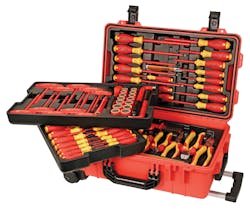
When servicing any hybrid electric vehicle (HEV) or battery electric vehicle (BEV), safety must be the top priority. Not only is it imperative to use the correct tools and personal protective equipment (PPE), but also to take precautions that other technicians in the shop are protected as well.
There is a full line of hand tools that are necessary to use while repairing high voltage systems. Hand tools that are tested and certified for high voltage work are all readily identified by both their color – a mix of orange and yellow – and a label that uses a symbol of two stacked triangles and “1000V” printed on the tool.
These tools are fully insulated and can provide protection up to 1,000V. A visual inspection is necessary to make sure there is no missing, broken, or worn insulation prior to each use. If there is even the slightest damage to the insulation, it may allow high voltage to contact the user, creating a very hazardous situation.
Another critical tool is a digital multimeter (DMM) that is built to a category III, 1,000V standard. This tool, along with category III test leads and ends must be used when testing high voltage systems. These electrical test tools allow the user to test and monitor high voltages safely and have the voltage ranges necessary to test HEVs and BEVs. It is imperative to visually inspect the test leads, connector ends, and the meter for any cracks or other wear, and stop using the tools if any flaws are detected.
One of the most important pieces of PPE a technician will use is a pair of Class 0 insulated rubber safety gloves, rated to 1,000V. Insulated gloves are to be worn anytime a technician is working on the vehicle’s battery or the inverter/converter. This includes when disconnecting or connecting the battery service plug and when using insulated tools.
Keeping others safe is as simple as placing warning notices or caution tape around the vehicle in order to communicate there is a potential risk of electrical shock. Warning signs and hazard tapes are available through many online sources and brick-and-mortar stores such as Grainger and Fastenal.
It is important to remember that using the correct tools will make working on electric vehicles safer as long as they are used and inspected correctly.
About the Author

Barry Hoyland
Barry Hoyland has been in the independent aftermarket for more than 45 years as a technician, technician instructor, shop owner, and shop management consultant. He owned and operated a successful Southern California automotive repair center that offers complete auto care and specialized in emission and diagnostic services for over 28 years. Hoyland also owned a company that modified vehicles to perform as emergency response units and mobile command centers, incorporating high-end electronic components into today’s vehicles. Hoyland has experience with all size and types of vehicles including traditional gas, hybrid electric, alternative fuel, and heavy duty diesel trucks.
Hoyland has provided consulting services for many automotive shops, fleets, and government agencies in order to improve their operational efficiencies.
In addition, he has worked with many NHRA drag racing teams as a crew chief on supercharged alcohol and nitro-methane fueled cars and currently serves as a crew chief on a Top Alcohol Funny Car, a Nostalgia Funny Car, and a Nostalgia Alcohol Dragster
Hoyland holds certifications in ASE: A1, A6, A8, and L1, MACS 609, maintains a California Advanced Emission license, and a CDL with endorsements for double and triple trailers, tankers, and HazMat.
When he is not helping to run a shop in the Pacific Northwest, Hoyland travels across the U.S. as an instructor of technical and shop management courses, many of which he has developed.